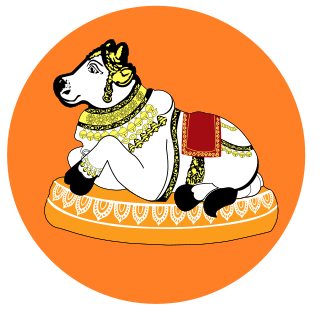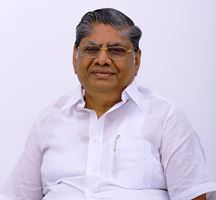
A yogi is a practitioner of Yoga, including a sannyasin or practitioner of meditation in Indian religions. The feminine form, sometimes used in English, is yogini.

The Siddhar in Tamil tradition is a perfected individual who has attained spiritual powers called siddhi.

Siddha is a term that is used widely in Indian religions and culture. It means "one who is accomplished." It refers to perfected masters who have achieved a high degree of perfection of the intellect as well as liberation or enlightenment. In Jainism, the term is used to refer to the liberated souls. Siddha may also refer to one who has attained a siddhi, paranormal capabilities.

Siddha Yoga is a spiritual path founded by Swami Muktananda (1908–1982). According to its literature, the Siddha Yoga tradition is "based mainly on eastern philosophies" and "draws many of its teachings from the Indian yogic texts of Vedanta and Kashmir Shaivism, the Bhagavad Gita and the poet-saints." The present head of Siddha Yoga is Gurumayi Chidvilasananda.

The Tirumantiram or Thirumantiram is a Tamil poetic work, written either in the 2nd century BCE and 4th century CE by Tirumular. It is the tenth of the twelve volumes of the Tirumurai, the key texts of Shaiva Siddhanta and the first known Tamil work to use the term. The Tirumantiram is the earliest known exposition of the Shaiva Agamas in Tamil. It consists of over three thousand verses dealing with various aspects of spirituality, ethics and praise of Shiva. But it is more spiritual than religious and one can see the difference between Vedanta and Siddhanta from Tirumular's interpretation of the Mahavakyas. According to historian Venkatraman, the work covers almost every feature of the siddhar of the Tamils. According to another historian, Madhavan, the work stresses on the fundamentals of Siddha medicine and its healing powers. It deals with a wide array of subjects including astronomy and physical culture.

Jetsun Milarepa was a Tibetan siddha, who was famously known as a murderer when he was a young man, before turning to Buddhism and becoming a highly accomplished Buddhist disciple. He is generally considered one of Tibet's most famous yogis and spiritual poets, whose teachings are known among several schools of Tibetan Buddhism. He was a student of Marpa Lotsawa, and a major figure in the history of the Kagyu school of Tibetan Buddhism. He is also famous for the feat of climbing Mount Kailash.

Natha, also called Nath, are a Shaiva sub-tradition within Hinduism in India and Nepal. A medieval movement, it combined ideas from Buddhism, Shaivism and Yoga traditions of the Indian subcontinent. The Naths have been a confederation of devotees who consider Shiva as their first lord or guru, with varying lists of additional gurus. Of these, the 9th or 10th century Matsyendranatha and the ideas and organization mainly developed by Gorakhnath are particularly important. Gorakhnath is considered the originator of the Nath Panth.
Siddhārtha is the birth name of the founder of Buddhism, Gautama Buddha.

Matsyendranātha, also known as Matsyendra, Macchindranāth, Mīnanātha and Minapa was a saint and yogi in a number of Buddhist and Hindu traditions. He is considered the revivalist of hatha yoga as well as the author of some of its earliest texts. He is also seen as the founder of the natha sampradaya, having received the teachings from Shiva. He is associated with Kaula Shaivism. He is also one of the eighty-four mahasiddhas and considered the guru of Gorakshanath, another known figure in early hatha yoga. He is revered by both Hindus and Buddhists and is sometimes regarded as an incarnation of Avalokiteśvara.

Gorakhnath was a Hindu yogi, mahasiddha and saint who was the founder of the Nath Hindu monastic movement in India. He is considered one of the two disciples of Matsyendranath. His followers are known as Jogi, Gorakhnathi, Darshani or Kanphata.
Shanti or Shanthi may refer to:

Siddha medicine is a form of traditional medicine originating in southern India. It is one of the oldest systems of medicine in India.
Gurudev Siddha Peeth is an Indian ashram run by the Gurudev Siddha Peeth Trust and serving the Siddha Yoga path. It is situated between the villages of Ganeshpuri and Vajreshwari in the state of Maharashtra, 70 miles (110 km) north-east of Mumbai. On the Siddha Yoga path it is known as the "mother ashram" because it is where Siddha Yoga began.
The Siddi are an ethnic group of African origin in India and Pakistan.
Indian medicine may refer to:

S. K. M. Maeilanandhan, is an Indian industrialist from Erode, Tamil Nadu. He is the founder of S. K. M. group of companies. In 2013, he was awarded Padma Shri, the fourth highest civilian award by the Government of India for his contributions to social service.
Paneenazhikath Narayana Vasudeva Kurup was an Indian Ayurvedic practitioner, researcher, writer and the founder director of the Central Council for Research in Homoeopathy (CCRIMH). He is a former vice chancellor of the Gujarat Ayurved University, Jamnagar and a former advisor of the Indian Systems of Medicine and Homoeopathy (ISM&H) of the Ministry of Health and Family Welfare. He has published several articles and a book, A Handbook on Indian Medicinal Plants, on the traditional Indian medicine system, The Government of India awarded him the fourth highest civilian honour of the Padma Shri, in 2005, for his contributions to Indian medicine.
This page is based on this
Wikipedia article Text is available under the
CC BY-SA 4.0 license; additional terms may apply.
Images, videos and audio are available under their respective licenses.









